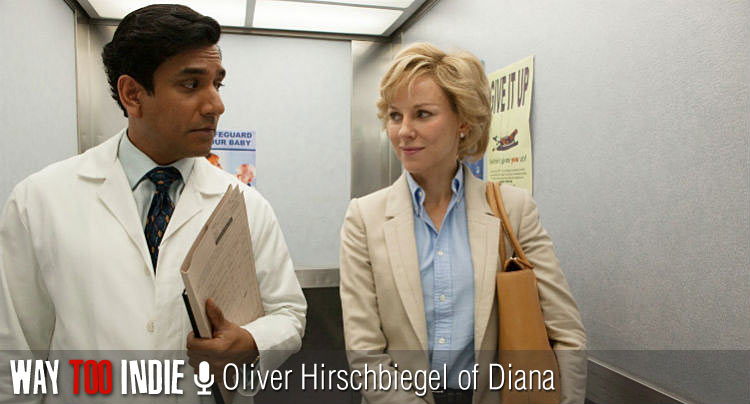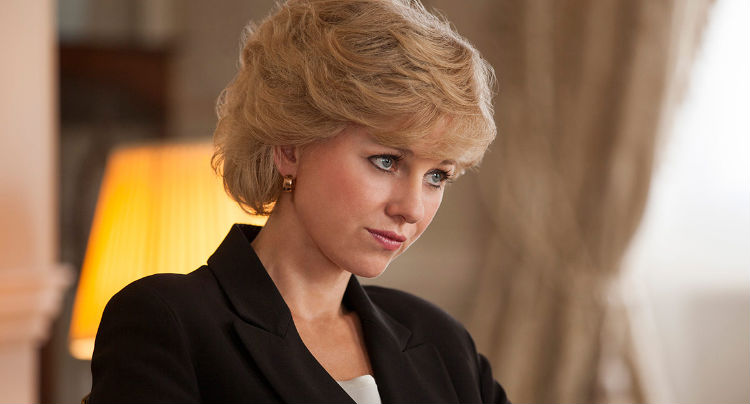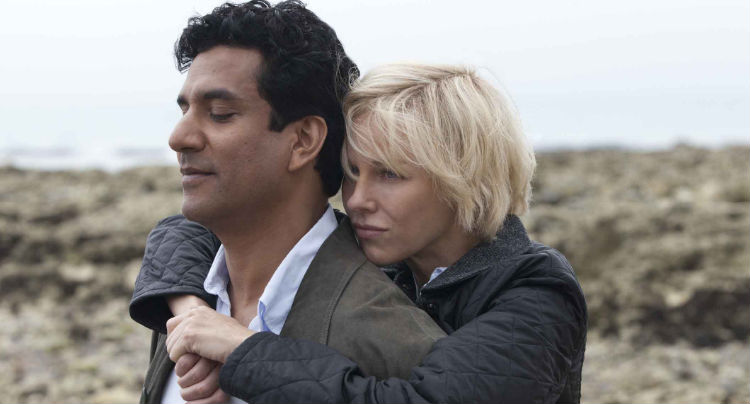Oliver Hirschbiegel talks ‘Diana’, Preserving the Princess’ Legacy

In Diana, director Oliver Hirschbiegel explores the passionate love affair that defined the twilight years of the most photographed person in history, Diana, Princess of Wales. Naomi Watts stars as the beloved Princess, with Naveen Andrews (LOST) playing the love of her life (according to Diana’s friends and family), doctor Hasnat Khan, a heart surgeon. Despite the crushing pressures of celebrity taking its toll on their relationship–eventually leading to their split–the love they shared revitalized Diana both as a person and as an activist.
Hirschbiegel discussed with us the responsibility of representing Diana on screen, her little-known inner conflicts and deep spirituality, Watts’ fear of taking on the role, why Diana’s family isn’t included in the film, and more.
Diana opens this Friday, November 1st in limited release.
Diana is so precious to so many people, almost as if they have a sense of ownership over her memory. Did you feel this film would give her a bit of her humanity back?
What I liked about the story was that it wasn’t known and wasn’t told, and I think it needed to be told. Aside from that, I liked that it was a universal love story. [The film] is about love. If you take Diana and Hasnat away, it would still work as a story on a universal level. The more I did my research, the more I realized the story needed to be told, because her legacy got really confused. People don’t remember all the things that she stood for. What they remember is the glamorous girl being the most famous woman in the world, flying around and hanging out with a playboy on a yacht in the Mediterranean, and then dying in that terrible accident in Paris. I thought that needed correction, you know?
Describe what your research process was like. Did you do extensive research on her entire life, or did you focus on the time around her relationship with Hasnat?
I went into anything I could find about her. The more I found out, the more I needed to find out. She’s a very complex character, constantly contradicting herself. She was very insecure, had a lack of self-esteem. At the same time, she was confident, flirtatious, wickedly humorous, and had a rebel thing about her. The next thing was, she was deeply spiritual, which is something I didn’t read anywhere. It’s something I found out when talking to her loved ones. She’s quite a handfu, really, for a director.
Talk about the responsibility that comes with portraying people who are still alive on film.
You just try to get it right. If you don’t really know what has happened and you just go by accounts, you go by assumption. You try to hit the spirit of that relationship.

I know Naomi was hesitant to take the role. Was she fearful when production began, or was she confident once she arrived on set?
The most powerful energy an actor can work with is fear. That goes for any artist. If you’re too confident, too sure of yourself, you’re likely to fail. She came onboard with all the respect that was needed. At the same time, she’d done her homework properly for months. And, of course, we had talked. It’s like me–I go to set every morning, shitting my pants. It’s always been like that. It’s a very good factor in the work. At the end of the day, if it feels right, it is right. That’s what I’ve learned when dealing with true stories. You know so much about it. You don’t create something or invent something. “It would be cool if…” You’re pretty much guided by the knowledge you’ve gained over months, really. Then, you kind of feel if it’s right or wrong.
Like you said, this is a love story, and it all hinges on Diana’s relationship with Hasnat. Talk a bit about Naveen Andrews and what he brought to the role.
I’d never met Hasnat, and I didn’t want to engage with him either. It would have stood in the way–I would have gotten involved on an emitional level that would have diminished my ability as an artist to tell a story. The man I saw was a very dignified, grounded, humble, old-fashioned gentlemen, which is not easy to find these days if you look at actors–most of them are boys. I don’t want to put them down, but they wouldn’t help me. I kept looking at Bollywood actors, and at the same time I was thinking about that Indian soldier who falls in love with Juliette Binoche in The English Patient. I looked him up and found that his name was Naveen Andrews. It somehow rang a bell. I realized he was a character on LOST! The funny thing is, I’ve watched all of the episodes of LOST. I love LOST. I just didn’t put two and two together. I got in touch with him via a one-hour Skype session. There he was–a dignified, grounded gentleman. We connected immediately, and I knew I had my man.
Diana and Hasnat are at the center of the film, but you also spend a good amount of time conveying Diana’s empathy; her work toward then banning of landmines, her visits with sick children…
The interesting thing about the last years of her life is, through this love she had with Hasnat, she sort of reinvents herself. Hasnat is real and has a purpose in his life–he wants to heal. It’s a calling, really. Through the energy of their love, she realized that she had a calling as well. So far, she’d only been the figure of charities, but now, she becomes the inventor of charity. She raised money for the Victor Chang Institute, auctioned off her clothes. Her biggest achievement was the landmine campaign. She becomes a stateswoman there. She puts herself on top of the landmine issue, and within a few days, she manages to turn it around when, for twenty years, the UN, the Red Cross, and very powerful politicians had tried that in vein. It’s really extraordinary and totally forgotten! Her legacy got totally confused over the car crash and the affair she had with Dodi Fayed, flying around and hanging out on a yacht.

Diana’s family isn’t in the film much at all.
When we meet her in the beginning, she’s very isolated. She’s cut off many friends and doesn’t have as many official tasks anymore. She’s separated from Charles, so there’s not much to say there. The sons are there, but it didn’t feel right to have them in there, because they’re still alive. It’s as if I’d be stepping over a line. That’s why I chose to not have them in there. She talks about them and there are pictures of them around, but at that time, her life revolved around Hasnat. There wasn’t much more to tell, really.
After all the research you’ve done on Diana, would you say this is the most interesting period or story of her life?
Yes, I would say so. For me, it’s the best way to shed light on the diversity of her character and the many contradicting aspects of her life, at the same time showing her achievements. Plus, she finally finds that love–what better story is there to tell? Love stories are an old-fashioned genre these days, but I think the world needs it. Maybe I’m a romantic, but it’s the kind of film I’ve been missing for a while.
Why do you think romance movies aren’t as prevalent these days?
I find it hard to explain that. For years, studios asked me, “What would you like to do?” I told them, “Well, I’d like to do a love story.” The’d look at me and say, “Really?” They were thinking romantic comedy. That’s not what I’m talking about. Romantic comedies always have a happy ending. In real life, love is the most powerful energy, but it doesn’t mean “happily ever after”. You can love somebody so much, but then it doesn’t work out for whatever reason. It doesn’t have to be anyone’s fault. It’s what we’re made of, really. Maybe people are scared about it. The studios certainly were scared about it! (laughs)
What’s great is, Diana has the look and aura of those old-fashioned, glamorous Hollywood actresses from the era when those type of romance movies were so popular, like Marlene Dietrich.
My first thought when looking deeper into Diana was that she kept reminding me of these old-fashioned movie stars–the way she carries herself, the way she always looks for the right angle. She hardly ever took a bad picture in her life. This is all stuff you’d find with those ladies back then. At the same time, there’s something vulnerable about them. Something wild, like we don’t quite know what’s going on with them. We don’t really have that anymore, but Diana had that, and I think it’s one of the reasons she became such an icon. People could relate to her. There was something very human, very touchable about her. People could sense a her dark side; her weaknesses and insecurities. It’s good that you’ve noticed that–it’s exactly what I was aiming for.
You didn’t know much at all about Diana going into the project, correct?
I had no idea, really.
Did you find that that was an advantage? Perhaps you aren’t beholden to the same preciousness for her other people would bring to the project. You could tell your story free of nostalgia.
It seems everybody has a clear idea about what she should or shouldn’t be, especially the English press! (laughs) I’m German. We don’t have a monarchy, so I didn’t know anything about it. I got into it, and I found a deeply insecure person; very unsteady, irrational, sometimes uncontrolled, a lack of self-esteem. But then, she’s also confident, flirtatious, wickedly humorous on the other end, looking for the limelight to get over these insecurities. while at the same time being spiritual. There’s so much going on. I think if I’d come from within that society, I wouldn’t have found all these things. I think it was a very good thing to come in as an outsider.
